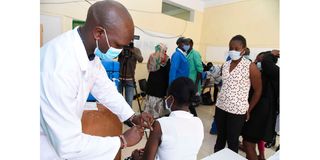Kenya risks isolation with low Covid-19 vaccine uptake

Mr Ronald Yegon, a nurse at Kapteldon Sub-County Hospital in Uasin Gishu County, administers a Covid-19 jab to one of the workers at Rivatex East Africa Limited in Eldoret Town on august 16, 2021.
Low uptake of Covid-19 vaccination could hurt Kenya, with the country risking isolation by the international community, experts have warned.
A potent mix of ignorance, lack of easy access, myths, disinformation and traditional and religious beliefs is derailing the uptake of the AstraZeneca jab, with only two in 100 Kenyans having been fully vaccinated by the end of last week.
A situation report released by the Health ministry shows that Coast and northern Kenya are lagging behind, with some counties, such as Marsabit, having fully inoculated a paltry 0.3 percent of their populations.
Mass inoculation provides a logical exit from coronavirus restrictions because the global consensus was initially towards ending the pandemic with vaccine-induced herd immunity.
But with the discovery and prevalence of increasingly vaccine-resistant variants, the goal is now reduction of serious illness, hospitalisations and deaths.
Kenya’s low vaccination uptake is particularly concerning, considering the world is moving towards 'vaccine apartheid'— where countries with low vaccination will remain off limits and on the ‘red list’.
“The CDC has issued a Level 3 Travel Health Notice for Kenya due to Covid-19, indicating a high level of Covid-19 in the country,” the official statement read in part.
“Your risk of contracting Covid-19 and developing severe symptoms may be lower if you are fully vaccinated with an FDA-authorised vaccine.”
This came less than a week after the UK retained Kenya on its Covid-19 red list even as it spared countries such as India where the Delta and Delta plus variants are wreaking more havoc.
In June, a number of Kenyans intending to travel to some European Union (EU) countries exclusively disclosed to the Nation that their Visa applications had been rejected.
A high ranking envoy from the EU in Kenya office confirmed it.
“We cannot pre-empt the decision of the European Medicines Agency (EMA), so there is no guarantee, but the indications are that likely outcome is likely to be positive for Covishield. A decision is due in the coming weeks,” a high ranking envoy told the Nation. Two months later, the EMA is yet to conclusively make a decision on approving the vaccine that is manufactured in India.
Such travel restrictions are likely to hurt businesses and hit the economy, with foreign exchange earners such as tourism likely to remain in the deep freeze.
But Dr Willis Akhwale, Kenya’s vaccine advisory task force chairman terms the predicament as “pure geopolitics”.
“Our current goal is to vaccinate as much as we can. We are expecting more J & J doses by 23rd or 24th this month, though Covax is yet to tell us exactly how many doses. We have taken lessons from the vaccine uptake situation report we released last week and things will be better,” he assured.

Mr Mihr Thakar, a geopolitical analyst based in Mombasa, is of the view that the government must ensure that people are being vaccinated with doses that will actually give them international mobility. He advises tourism-dependent countries to agitate with their top source markets to allow fully vaccinated travellers to move freely, providing ease of movement and clarity on the process.
“This will spur this new generation of anti-body carrying travellers who not only require stringent and transparent protocol, but also the initial willingness to sacrifice reciprocity depending on income level.”
Dr Gitahi Githinji, the CEO of Amref Health Africa and an advisor of Kenya’s Covid-19 Vaccine Advisory Task force, told the Nation that main issue is not really about the country’s uptake of vaccines but quality assurance.
“If the data that is available in terms of the quality assurance of Covid-19 tests is not adequate then you find that governments that have intelligence on these things are the ones that have trust issues,” he said.
“What the Kenyan government needs to do is invest in quality assurance of the laboratory diagnostics, data available so that those receiving the data have confidence in it.”
Dr Ahmed Kalebi, Consultant Pathologist, yesterday told the Nation advised that people who are yet to accept the vaccine to have a mindset shift lest Covid-19 hits home, and hits hard.
Low vaccine uptake
“We have seen in the real-world where many anti-vaxxers have ended up getting Covid-19 and dying, with many harrowing reports from places like the United Kingdom and USA where those dying of Covid-19 regret on their deathbeds when it is too late,” he told the Nation.
He warned that counties that have generally low vaccine uptake risk getting more hospitalisations should infections soar, especially with the Delta variant in the country.
“Those populations with low uptake will getting higher incidences of hospitalisation and deaths than the ones who will have good uptake of the vaccines particularly affecting the elderly and the vulnerable with pre-existing conditions,” he said
The highly mobile working-class, middle-aged individuals, he said, will act as super spreaders if they fail to get the vaccine.
“It is therefore of personal individual interest for everyone to get vaccinated and protect themselves well if they can access the vaccine, and also of community and public interest as they will protect others as well.”
Additional report by Hellen Shikanda





